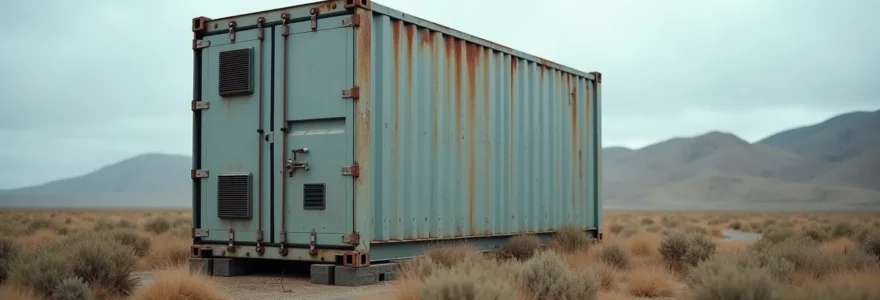For decades, off-grid operations have treated energy as a necessary evil: a volatile, unpredictable, and often substantial line item on the budget, dictated by the fluctuating price of diesel and complex supply chains. This reactive approach, however, is rapidly becoming obsolete. The conversation is no longer about simply finding a cleaner or quieter alternative to a generator. It’s about a fundamental strategic shift.
Modern mobile battery energy storage systems (BESS) are not just operational tools; they are financial instruments that transform energy from an uncontrollable expense into a predictable, manageable, and strategic asset. By embracing this technology, organizations can de-risk their entire operational framework, unlock new revenue streams, and build a powerful competitive advantage that was previously unimaginable.
Mobile Power Strategy in 4 Key Shifts
- From Expense to Asset: Transform volatile energy costs into a predictable and manageable operational asset.
- From Risk to Resilience: Insulate your projects from fuel price shocks and supply chain disruptions.
- From Limitation to Opportunity: Enable 24/7, silent, and emission-free operations in sensitive or regulated zones.
- From Reactive to Predictive: Leverage energy data for true operational agility, predictive maintenance, and ESG compliance.
From Energy Expense to Strategic Asset: How Mobile Storage De-Risks Your Entire Operation
The primary paradigm shift offered by mobile battery storage is redefining energy as a strategic asset. Instead of being at the mercy of fuel markets, organizations can now achieve unprecedented control over their energy costs and availability. This transition is not merely an accounting change; it’s a powerful de-risking mechanism for the entire operation. This growing financial and strategic importance is why the global off-grid battery energy storage market is projected to reach $72.56 billion by 2032, up from $19.99 billion in 2025.
A BESS insulates projects from the constant threat of diesel price hikes, logistical bottlenecks in remote locations, and the inherent risks of transporting flammable fuel. This newfound stability is what we call “energy resilience.” It’s far more than simple backup power; it’s the guaranteed operational continuity that allows mission-critical projects—from construction to disaster relief—to function without interruption. These systems for mobile energy storage are making this resilience more accessible as technology costs fall, with an observed 20% decline since 2023 in average lithium-ion battery pack prices.
What is operational de-risking with BESS?
It is the strategic process of insulating a project from energy-related risks like fuel price volatility, supply chain disruptions, and delivery logistics by using a predictable, self-contained power source like a mobile battery.
By enabling peak shaving and load shifting, BESS can move energy from low-cost hours to high-demand periods that results in reduced prices, eases energy congestion, and defers costly transmission and distribution upgrades.
– IEEE Innovation@Work, Battery Energy Storage Systems: The Backbone of a Reliable Grid
This principle is already proving effective on a larger scale. A report focusing on Latin America and the Caribbean notes that off-grid renewable solutions, often anchored by storage, could address a significant portion of the region’s electricity gap. These systems can provide power at costs that are competitive with, or even cheaper than, the national grid, demonstrating their financial viability beyond simple diesel replacement.
Rewriting the Project Blueprint: The Ripple Effect on Bidding, Planning, and Execution
The ability to accurately forecast and control energy costs has profound implications that ripple through every phase of a project lifecycle. It starts at the most competitive stage: the bidding process. Companies reliant on diesel must factor in wide margins for price fluctuations, often leading to less competitive or riskier bids. In contrast, a BESS-powered operation can present a bid with fixed, predictable energy costs, creating a powerful financial advantage from day one.
This strategic advantage extends directly into project planning and execution. The silent, emission-free nature of battery storage unlocks new possibilities for site selection and operational timelines. Projects can now run 24/7 in noise-sensitive urban areas or operate in environmentally regulated zones where generators would be prohibited. This flexibility can dramatically accelerate project completion and reduce overheads associated with stop-work orders or restricted hours.
Project Bidding Advantage Checklist with BESS
- Develop detailed 3-year energy cost forecast using historical diesel volatility data to demonstrate competitive pricing advantage.
- Document noise and emission compliance capabilities enabled by BESS, positioning project for noise-sensitive or regulated zones.
- Quantify reduced logistics overhead (fewer fuel deliveries, simplified maintenance) as direct cost reduction in project bid.
- Model 24/7 operational capability on restricted sites where traditional generators face deployment limitations.
- Present BESS resilience features to mitigate supply chain risk, emphasizing operational continuity and reduced interruption probability.
Furthermore, the logistical footprint is drastically reduced. As experts in power supply bidding highlight, a successful bid relies on managing interdependent elements effectively. By eliminating the need for frequent fuel deliveries and reducing on-site generator maintenance, BESS simplifies logistics, cuts down on traffic, lowers labor costs, and significantly improves site safety—all of which are tangible benefits that directly impact the project’s bottom line.
Unlocking New Frontiers: Enabling Operational Models Previously Out of Reach
Beyond optimizing existing operations, mobile battery storage is a key that unlocks entirely new business models and operational frontiers. It facilitates “pop-up” infrastructure for projects where traditional power is impractical or impossible. Consider rapid-deployment scientific research camps in remote ecosystems, advanced disaster relief hubs in grid-down scenarios, or exploratory mining operations in inaccessible territories. BESS makes these endeavors logistically feasible and financially viable.
Alaska Off-Grid Wind Integration with Battery Storage
Kenai Electric Association (KEA) deployed a 3 MW/750 kWh advanced lead-acid BESS to integrate an additional 4.5 MW of wind capacity into an island system. Within six months, the system enabled integration of 8 million additional kWh of wind power, displacing diesel generation worth USD 560,000 in equivalent operating costs, while improving sustainability and reducing operating expenses.
The strategic value of silent, emission-free power also opens doors to new, high-value client segments. In sensitive environments like filmmaking, high-profile outdoor events, or scientific environmental monitoring, the noise and fumes of a generator are unacceptable. Mobile BESS provides the clean, quiet, and reliable power that these premium clients demand, turning an operational capability into a powerful business development tool.

As noted by experts in emergency power solutions, this technology is critical for resilience during natural disasters, ensuring that healthcare and communication systems remain online. Finally, this technology directly addresses the growing pressure for corporate accountability. Leveraging a mobile BESS helps companies meet and exceed stringent Environmental, Social, and Governance (ESG) mandates, making them a preferred partner for sustainability-focused corporations, investors, and governments.
Key Takeaways
- Energy is no longer just a cost; with BESS, it becomes a strategic asset that de-risks operations.
- Predictable energy costs provide a significant competitive advantage in project bidding and financial planning.
- Mobile storage unlocks new operational models in sensitive, remote, or regulated environments previously off-limits.
- Data from intelligent BESS provides predictive insights and verifiable ESG compliance reporting for modern businesses.
The Power of Intelligence: Achieving True Agility Through Data and Hybridization
The true “game-changing” aspect of modern BESS lies in its intelligence. The concept of “flexibility” goes far beyond simply being mobile. It encompasses dynamic power scaling, where the system can perfectly match the actual energy demand of an operation. This eliminates the massive inefficiencies of oversized generators running at low loads or under-loaded generators struggling to meet peak demand, saving fuel and reducing wear.

This intelligence is powered by data. Remote monitoring provides far more than a simple state-of-charge reading. It enables predictive maintenance, optimized load management across multiple sites, and the generation of verifiable reports for carbon credits or ESG compliance. This data-driven approach transforms operational management from reactive to predictive, a trend that is rapidly accelerating, as seen in the 26x growth of battery storage capacity in California’s ISO from 2020 to 2024.
How does BESS eliminate generator inefficiency?
A BESS perfectly matches power output to real-time demand, from near-zero to peak loads. This avoids the massive fuel waste and mechanical strain that occurs when diesel generators run inefficiently at partial capacity.
Advanced power monitoring systems constantly scan for irregularities or patterns, allowing businesses to detect problems before they manifest as failures. Without these systems, companies are flying blind, reacting after an issue has occurred.
– Schneider Electric Energy Management, Unlocking the Future of Predictive Maintenance with Advanced Power Monitoring
Ultimately, a BESS is a future-proof platform. It serves as the central hub of a mobile microgrid, designed to seamlessly integrate with other energy sources like solar, wind, or even emerging solutions. This capability protects the initial investment for the long term, ensuring the system can adapt as new technologies become available. Understanding the role of innovation in energy storage is crucial for building a resilient and forward-thinking energy strategy.
Choosing the right battery chemistry is key to optimizing performance for a specific use case, from long-duration industrial needs to highly mobile applications.
| Battery Technology | Energy Density | Cycle Life | Cost per kWh | Ideal Use Case |
|---|---|---|---|---|
| Lithium Iron Phosphate (LFP) | 120-180 Wh/kg | 4,000-6,000 cycles | $100-150 | Long-duration storage, industrial, grid-scale |
| Nickel-Manganese-Cobalt (NMC) | 150-250 Wh/kg | 2,000-3,500 cycles | $120-180 | Portable, mobile applications |
| Lead-Acid Advanced | 30-50 Wh/kg | 1,000-2,000 cycles | $60-100 | Frequency response, backup power |
| Sodium-Ion (Emerging) | 100-130 Wh/kg | 3,000-4,000 cycles | $70-120 | Cost-sensitive, long-duration, recycling-friendly |
By adopting mobile BESS, organizations are not just buying a piece of equipment; they are adopting a new philosophy of energy management. It’s a move away from operational vulnerability and toward strategic agility, financial predictability, and a sustainable future. As part of a diversified energy approach, it’s also worth it to explore hydrogen generator technology for specific long-duration or high-power needs.
Frequently Asked Questions on Mobile Storage Solutions
What’s the main difference between a mobile BESS and a diesel generator?
The main difference is strategic. A generator is a single-purpose tool that produces power by burning fuel, creating a variable cost. A mobile BESS is an intelligent energy management system that stores power, offering silent, emission-free operation, precise cost control, and the ability to integrate with renewables, turning energy into a predictable asset.
Can mobile battery storage power a large construction site?
Yes. Modern mobile BESS units are scalable and can be combined in parallel to meet high power demands. They are frequently used to power heavy machinery, tower cranes, and site facilities, either as the primary power source or in a hybrid setup with a smaller generator or solar array to optimize fuel consumption and reduce emissions.
Is mobile battery storage expensive?
While the initial capital investment for a BESS can be higher than for a traditional generator, the total cost of ownership (TCO) is often significantly lower. This is due to massive savings on fuel, reduced maintenance, elimination of logistical costs for fuel delivery, and the avoidance of penalties in emission-regulated zones. The financial predictability it offers also creates its own economic value.
How does mobile storage support ESG goals?
Mobile storage directly supports all three pillars of ESG. Environmentally, it reduces or eliminates carbon emissions and noise pollution. Socially, it improves on-site safety and enables power for disaster relief. For Governance, it provides verifiable data for transparent emissions reporting and demonstrates a corporate commitment to sustainable practices.
